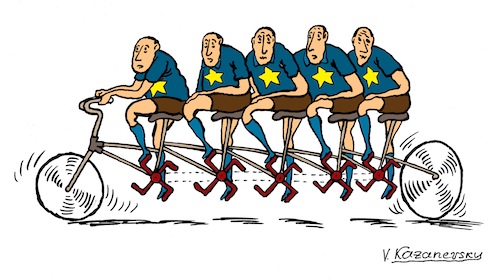After the triumph of eurosceptic and xenophobic movements, amid mass rejection of European institutions, Slavoj Žižek wonders “why it took the anti-immigrant right so long to make a decisive breakthrough”.
After all, writes the Slovenian philosopher in the The New Statesman, a politician like Marine Le Pen of France’s National Front “forms a clear contrast to the sterile European technocrats: addressing the worries of ordinary people, she brings passion back to politics.”
But if 25 May’s electoral success of the National Front and other eurosceptic parties was unsurprising, the philosopher also notes a “feigned naivety” in liberal reactions to it. Žižek argues technocrats running Brussels and populist eurosceptic parties represent two sides of the same coin —
The basic mode of politics today is a depoliticised expert administration and coordination of interests. The only way to introduce passion into this field, to actively mobilise people, is through fear: fear of immigrants, fear of crime, fear of godless sexual depravity, fear of the excessive state itself, with its burden of high taxation, fear of ecological catastrophe, fear of harassment...
Receive the best of European journalism straight to your inbox every Thursday
Eurosceptics like Le Pen find popular appeal by rejecting what Žižek calls a European “ruling elite” that “know less and less how to rule” —
Look at how Europe is dealing with the Greek crisis: putting pressure on Greece to repay debts, but at the same time ruining its economy through imposed austerity measures and thereby making it sure the Greek debt will never be repaid. [...] The EU’s demands and commands [...] don’t even give a chance to Greece, because Greek failure is part of the game.
[[For Žižek, the rise of anti-immigrant populism that characterises the European elections represents a “failure of the leftist alternative to global capitalism”]], but also “proof there was once a revolutionary potential, a dissatisfaction which the left was not able to mobilise”.
In The Guardian, journalist Antony Loewenstein considers Žižek’s arguments in light of corruption in Greece’s ailing health care system. Loewenstein describes taking part in a recent discussion panel —
The crowd argued that Greece’s dark and racist past, along with its similar present, must be rejected. Yet finding an effective response to the use and abuse of nationalism, so beloved of the far-right and current government, is no easy task. Thankfully, there are signs that many Greeks are blaming those directly responsible for the current crisis and not believing a person like IMF head Christine Lagarde, who remains in denial about how her organisation punishes the most vulnerable in Greece.
Was this article useful? If so we are delighted!
It is freely available because we believe that the right to free and independent information is essential for democracy. But this right is not guaranteed forever, and independence comes at a cost. We need your support in order to continue publishing independent, multilingual news for all Europeans.
Discover our subscription offers and their exclusive benefits and become a member of our community now!












